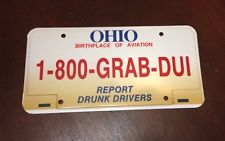 When a driver is prosecuted for operating a vehicle under the influence of drugs (called ‘OVI’ in Ohio), what evidence is sufficient to sustain a conviction? The prosecution must prove the defendant operated a vehicle under the influence of a drug of abuse. That requires the prosecution to prove the defendant was impaired while operating the vehicle, identify the specific drug which was ingested, and link the drug’s ingestion to the defendant’s impairment.
When a driver is prosecuted for operating a vehicle under the influence of drugs (called ‘OVI’ in Ohio), what evidence is sufficient to sustain a conviction? The prosecution must prove the defendant operated a vehicle under the influence of a drug of abuse. That requires the prosecution to prove the defendant was impaired while operating the vehicle, identify the specific drug which was ingested, and link the drug’s ingestion to the defendant’s impairment.
Articles Posted in DUI/OVI laws and cases
Repeat DUI /OVI Offenses in Ohio
 According to a story by NBC4i, the Ohio State Highway Patrol reports that 30% of DUI arrests (called ‘OVI’ in Ohio’) come from repeat offenders. In Ohio, the mandatory OVI penalties increase with every conviction in ten-years (called the ‘lookback period’). Those penalties include vehicle sanctions, license suspensions, incarceration, and other consequences.
According to a story by NBC4i, the Ohio State Highway Patrol reports that 30% of DUI arrests (called ‘OVI’ in Ohio’) come from repeat offenders. In Ohio, the mandatory OVI penalties increase with every conviction in ten-years (called the ‘lookback period’). Those penalties include vehicle sanctions, license suspensions, incarceration, and other consequences.
Ohio’s Distracted Driving Laws
 With the media reporting the recent changes to Ohio’s distracted driving laws, Ohio drivers probably have questions. In what circumstances am I prohibited from using a cell phone when I’m driving? In what circumstances am I permitted to use a cell phone when I’m driving? What is the law on ‘distracted driving’? Can I be stopped for violating these laws? What are the penalties if I’m caught? What if I am under 18? This article answers those questions.
With the media reporting the recent changes to Ohio’s distracted driving laws, Ohio drivers probably have questions. In what circumstances am I prohibited from using a cell phone when I’m driving? In what circumstances am I permitted to use a cell phone when I’m driving? What is the law on ‘distracted driving’? Can I be stopped for violating these laws? What are the penalties if I’m caught? What if I am under 18? This article answers those questions.
New Ohio DUI/OVI Regulations Authorize Oral Fluid Testing

In November of 2022, an article in this blog reported the state of Ohio intends to use oral fluid testing in the future. The future is here. When NBC4 reported on the Traffic Safety Council’s recommendation of oral fluid testing for DUI cases (called ‘OVI’ in Ohio), the Ohio Department of Health had already passed new regulations which add oral fluid to the bodily substances which may be tested. Those regulations became effective on January 23, 2023.
Continue Reading
Change of Venue for Serious Vehicular Crimes in Ohio
 The issue of venue recently arose in an Ohio Vehicular Homicide case. As reported by the Leader-Telegram, the defendant was accused of hitting two highway workers in Clark County. As a result of the collision, one worker died, and the other was seriously injured. The defense attorney filed a motion for change of venue. What is venue, and when can it be changed?
The issue of venue recently arose in an Ohio Vehicular Homicide case. As reported by the Leader-Telegram, the defendant was accused of hitting two highway workers in Clark County. As a result of the collision, one worker died, and the other was seriously injured. The defense attorney filed a motion for change of venue. What is venue, and when can it be changed?
Continue Reading
Legislature Considers Changes to Ohio Marijuana DUI/OVI Laws
 We’ve used this space in the past to discuss issues with Ohio’s approach to DUI (called ‘OVI’ in Ohio) cases involving marijuana. The rising prevalence of marijuana OVIs following Ohio’s legalization of medical marijuana has shown Ohio’s OVI laws are woefully out-of-date to deal with these issues. A recent bill in the Ohio Senate seeks to update the way the law treats marijuana OVIs. This bill, if passed, would have a profound impact on the way marijuana OVI cases are charged, handled by courts, and defended by OVI defense attorneys.
We’ve used this space in the past to discuss issues with Ohio’s approach to DUI (called ‘OVI’ in Ohio) cases involving marijuana. The rising prevalence of marijuana OVIs following Ohio’s legalization of medical marijuana has shown Ohio’s OVI laws are woefully out-of-date to deal with these issues. A recent bill in the Ohio Senate seeks to update the way the law treats marijuana OVIs. This bill, if passed, would have a profound impact on the way marijuana OVI cases are charged, handled by courts, and defended by OVI defense attorneys.
Continue Reading
No Contest Pleas in Ohio DUI/OVI Cases
 Rejecting a No Contest plea may be an abuse of a judge’s discretion, according to a case decided last week by the Ohio Supreme Court. A plea of No Contest is different than a guilty plea, and the plea of No Contest is used for two purposes in DUI (called ‘OVI’ in Ohio) cases. Although a judge’s approval is required for a plea of No Contest, the case decided last week makes it clear a judge’s refusal to give approval may be overturned.
Rejecting a No Contest plea may be an abuse of a judge’s discretion, according to a case decided last week by the Ohio Supreme Court. A plea of No Contest is different than a guilty plea, and the plea of No Contest is used for two purposes in DUI (called ‘OVI’ in Ohio) cases. Although a judge’s approval is required for a plea of No Contest, the case decided last week makes it clear a judge’s refusal to give approval may be overturned.
Continue Reading
Yellow License Plates for DUI/OVI in Ohio
 The special license plates for DUI offenders are commonly referred to as “party plates” and “family plates”. The official term in Ohio is “restricted license plates”. Whatever you call them, nobody wants them. In Ohio, the plates are yellow with red lettering, and they signal to everybody the driver of that vehicle was convicted of DUI (called ‘OVI’ in Ohio). This article explains when the plates are required, how they are obtained, and possible penalties for restricted plate violations.
The special license plates for DUI offenders are commonly referred to as “party plates” and “family plates”. The official term in Ohio is “restricted license plates”. Whatever you call them, nobody wants them. In Ohio, the plates are yellow with red lettering, and they signal to everybody the driver of that vehicle was convicted of DUI (called ‘OVI’ in Ohio). This article explains when the plates are required, how they are obtained, and possible penalties for restricted plate violations.
Ohio Supreme Court Settles Speedy Trial Issue in DUI/OVI Cases
 In DUI cases (called ‘OVI’ in Ohio), a defendant is sometimes charged with two OVI charges. One charge is OVI ‘impaired’, based on operating a vehicle under the influence of alcohol and/or drugs. The other charge is OVI ‘per se’, based on operating a vehicle with a prohibited concentration of alcohol and/or drugs in the driver’s breath, blood, or urine. In cases involving blood and urine tests, the charge of OVI ‘per se’ is often filed weeks or months after the charge of OVI ‘impaired’ is filed, as law enforcement waits to file the ‘per se’ charge until after receiving the results of the blood/urine test.
In DUI cases (called ‘OVI’ in Ohio), a defendant is sometimes charged with two OVI charges. One charge is OVI ‘impaired’, based on operating a vehicle under the influence of alcohol and/or drugs. The other charge is OVI ‘per se’, based on operating a vehicle with a prohibited concentration of alcohol and/or drugs in the driver’s breath, blood, or urine. In cases involving blood and urine tests, the charge of OVI ‘per se’ is often filed weeks or months after the charge of OVI ‘impaired’ is filed, as law enforcement waits to file the ‘per se’ charge until after receiving the results of the blood/urine test.
In those cases, when does the speedy trial clock start for the later-filed charge of OVI ‘per se’? Is it when the original charge was filed, when the test results were received, or when the second charge is filed? That question was recently answered by the Ohio Supreme Court.
Ohio Supreme Court: Forfeiture of $31,000 Vehicle for DUI/OVI Not Excessive
 Back in 1791, when the 8th Constitutional Amendment was ratified, the Framers of the Constitution decided there should be limits on financial sanctions for criminal behavior. Accordingly, the 8th Amendment prohibits ‘excessive fines’. Courts have interpreted the Constitutional prohibition of excessive fines to apply to forfeiture of property in criminal cases. The Ohio Supreme Court recently held that forfeiture of a $31,000 vehicle for a repeat DUI conviction (called ‘OVI’ in Ohio) does not violate the Excessive Fines Clause of the 8th Amendment.
Back in 1791, when the 8th Constitutional Amendment was ratified, the Framers of the Constitution decided there should be limits on financial sanctions for criminal behavior. Accordingly, the 8th Amendment prohibits ‘excessive fines’. Courts have interpreted the Constitutional prohibition of excessive fines to apply to forfeiture of property in criminal cases. The Ohio Supreme Court recently held that forfeiture of a $31,000 vehicle for a repeat DUI conviction (called ‘OVI’ in Ohio) does not violate the Excessive Fines Clause of the 8th Amendment.
 Columbus OVI/DUI Attorney Blog
Columbus OVI/DUI Attorney Blog

